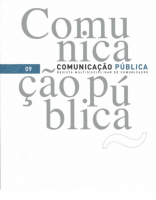A portuguese voice in Canada
media, migrations and identity negotiations
DOI:
https://doi.org/10.4000/cp.7651Keywords:
media, ethnography, portuguese migrations, identityAbstract
Gente da Nossa is a TV show produced in Toronto, Canada, by a small team of second generation Portuguese/Azorean migrants. Mainly focused in the Portuguese migrant population residing in Canada but broadcasted to all North America and Bermuda and present in the Internet, this weekly TV show is currently being studied both as a window to the Portuguese migrants’ communal agendas in Canada and as a media tool that eventually to some extent represents, speaks for and contributes to the public positioning of the community. Although the research intends to address a considerable set of issues related to the shows’ reception and its audiences, this article is totally focused on the contents displayed and in the shows producers. The shows’ weekly episodes displayed in the internet were recorded during one year (2006/07) and submitted to a content analysis structured according to the main thematics emerging from the shows structure and agenda. Besides promoting a solid description of show, this methodological option reflects the intention of developing an ethnographic approach primarily focused on the main events, questionings and problems selected by the producers, as well as the ways those are addressed, displayed and discussed during the time period analysed.
Downloads
References
Altheide, D. (1996) Qualitative Media Analysis, London: Sage. DOI : 10.4135/9781452270043 good / bad
Anderson, G.; Higgs, D. (1976) A Future to Inherit. The Portuguese Communities of Canada, Toronto: McClelland and Stewart.
Baumann, G. (2003) [1996] Contesting Culture. Discourses of Identity in Multi-Ethnic London, Cambridge: Cambridge University Press.
Bendix, R. (2005) «Final Reflections: ‘The Politics of Folk Culture’ in the 21st Century», Etnográfica, vol 9 (1), pp. 195-203.
Bhabha, H. K. (2002) [1994] The Locations of Culture, London: Routledge. DOI : 10.4324/9780203820551 good / bad
Eriksen, T. (2006) «Nations in Cyberspace», Short version of the 2006 Ernest Gellner lecture, ASEN conference, London School of Economics (EASA Media Anthropology Network), http://www.media-anthropology.net/workingpapers.htm
Fortier, A. (2000), Migrant Belongings: Memory, Space, Identity, Oxford: Berg.
Gardner, K. (2002), Age, Narrative and Migration. The Life Course and Life Histories of Bengali Elders in London, Oxford: Berg.
Giles, W. (2002), Portuguese Women in Toronto. Gender, Immigration and Nationalism, Toronto: University of Toronto Press. DOI : 10.3138/9781442678644 good / bad
Gilroy, P. (2003) [1993] «The Black Atlantic as a Counterculture of Modernity», in Braziel, J. E., Mannur, A. (eds.), Theorizing Diaspora, Oxford: Blackwell, pp. 49-80.
Ginsburg, F. (1997) «‘From Little Things, Big Things Grow’: Indigenous Media and Cultural Activism» in R. Fox and O. Starn (eds) Between Resistance and Revolution. Cultural Politics and Social Protest, New Brunswick/New Jersey/London: Rutgers University Press: 118-44.
Ginsburg, F.; Abu-Lughod, L.; Larkin, B. (2002) (eds) Media Worlds. Anthropology on new terrain, Berkeley/Los Angeles/London: University of California Press. Ginsburg, F. (2007) «Rethinking the Digital Age», http://www.media-anthropology.net/ginsburg_digital_age.pdf
Hall, S., Du Gay, P. (eds.) (1997) Questions of Cultural Identity, London: Sage.
Hall, S. (2003) [1990] «Cultural Identity and Diaspora», in Braziel, J. E., Mannur, A. (eds.), Theorizing Diaspora, Oxford: Blackwell, pp. 233-246.
Mahon, M. (2000) «The Visible Evidence of Cultural Producers», Annual Review of Anthropology, n. 29, pp. 467-492.
Marcus, G. (1996) (ed.) Connected. Engagements with Media, Chicago/London: University of Chicago Press.
Miller, D. (1995) Worlds Apart: Modernity trough the Prism of the Local, London: Routledge. DOI : 10.4324/9780203450970 good / bad
Miller, D.; Slater, D. (2000) The Internet: An Ethnographic Approach, Oxford: Berg.
Morley, D.; Silverstone, R. (1990) «Domestic Communication: Technologies and Meanings», Media, Culture, & Society, 12 (1): 31-55. DOI : 10.1177/016344390012001003 good / bad
Noivo, E. (1999) Inside Ethnic Families: three generations of Portuguese-Canadians, Montreal/Kingston: McGill-Queen’s University Press.
Pacheco, D. (2004) Contested Belongings. Crowding the Portuguese-Speaking Diaspora in Canada, tese para a obtenção do grau de Master of Arts, Universidade de Toronto.
Riggins, S. (ed) (1992) Ethnic Minority Media. An International Perspective, Newbury Park/London/New Delhi: Sage. DOI : 10.4135/9781483325309 good / bad
Spitulnik, D. (1998) «Mediated Modernities: Encounters with the Electronic in Zambia.» Visual Anthropology Review, 14(2):63-84. DOI : 10.1525/var.1998.14.2.63 good / bad
Downloads
Published
Issue
Section
License
Copyright (c) 2010 Direitos do Autor (c) 2010

This work is licensed under a Creative Commons Attribution-NonCommercial 4.0 International License.
Os conteúdos da Comunicação Pública estão licenciados com uma licença Creative Commons - Atribuição-NãoComercial 4.0 Internacional.


